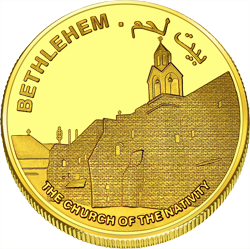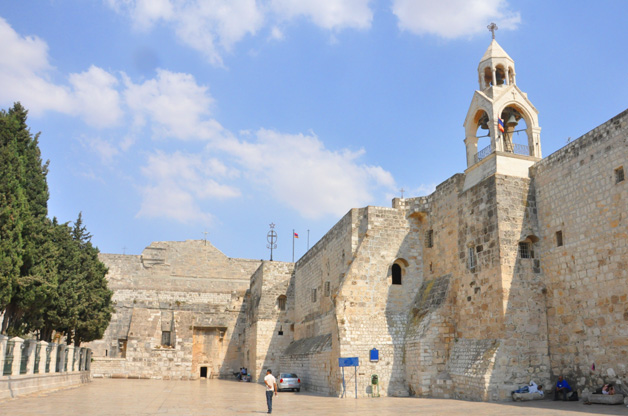The Church of the Nativity, or Basilica of the Nativity is a basilica located in Bethlehem in the Palestinian West Bank. The grotto it contains holds a prominent religious significance to Christians of various denominations as the birthplace of Jesus. The grotto is the oldest site continuously used as a place of worship in Christianity, and the basilica is the oldest major church in the Holy Land.
The church was originally commissioned by Constantine the Great a short time after his mother Helena's visit to Jerusalem and Bethlehem in 325-326, on the site that was traditionally considered to be the birthplace of Jesus. That original basilica was likely built between 330-333, being already mentioned in 333, and was dedicated on 31 May 339. It was destroyed by fire during the Samaritan revolts of the sixth century, possibly in 529, and a new basilica was built a number of years later by Byzantine Emperor Justinian (r. 527-565), who added a porch or narthex, and replaced the octagonal sanctuary with a cruciform transept complete with three apses, but largely preserved the original character of the building, with an atrium and a basilica consisting of a nave with four side aisles.
The Church of the Nativity, while remaining basically unchanged since the Justinianic reconstruction, has seen numerous repairs and additions, especially from the Crusader period, such as two bell towers (now gone), wall mosaics and paintings (partially preserved). Over the centuries, the surrounding compound has been expanded, and today it covers approximately 12,000 square meters, comprising three different monasteries: one Greek Orthodox, one Armenian Apostolic, and one Roman Catholic, of which the first two contain bell towers built during the modern era.
The silver star marking the spot where Christ was born was stolen in 1847. Some assert that this was a contributing factor in the Crimean War against the Russian Empire. Others assert that the war grew out of the wider European situation.
Since 2012, the Church of the Nativity is a World Heritage site and was the first to be listed by UNESCO under 'Palestine'.
A 250-year old understanding among religious communities, the Status Quo, applies to the site.


